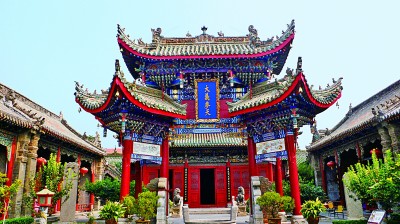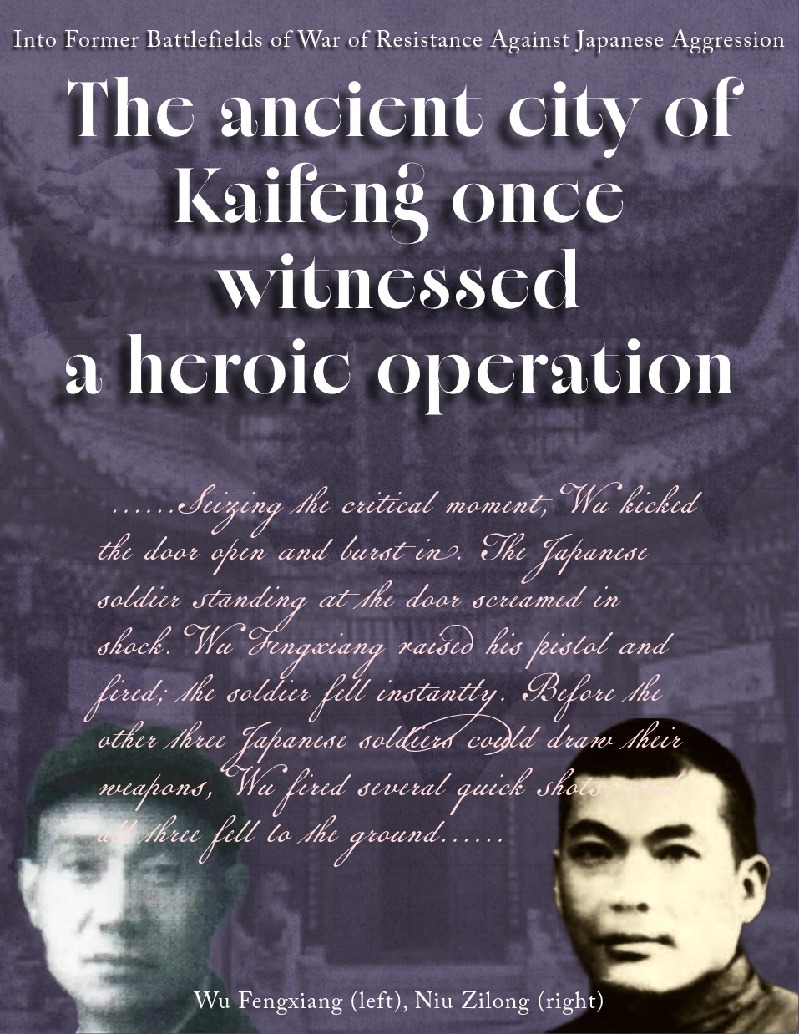


Photo shows the Shan-Shaan-Gan Guild Hall in Kaifeng City, central China’s Henan Province. (Li Junsheng/Guangming Pictures)

Spring in Kaifeng should have been a season of tender willows and bright sunshine. Yet in the spring of 1940, the ancient city was shrouded in grief and stained with blood. Another 122 resistance fighters had just been brutally killed by Japanese troops.
The order was issued by Yoshikawa Teisa, head of the Japanese intelligence agency in North China. Since arriving in Kaifeng, this notorious demon had personally ordered the execution of 466 resistance fighters in just over half a year.
This brutality could not continue unchecked. Underground organizations of both the Communist Party and the Nationalist Party in Kaifeng jointly decided: Teisa must be eliminated.
Niu Zilong, a CPC underground member who also served as team leader of the Nationalist government's Bureau of Investigation and Statistics (BIS) station in Henan, was tasked with leading the operation. He quickly formed an assassination squad, first recruiting his former student Wu Fengxiang, whom he had taught at Jia County Normal School.
Wu, also a CPC underground member, had been arrested in 1936 for sending progressive youth to Yan’an and imprisoned in Jia County. After escaping with Party assistance the following year, he hid in the Xiaomo Mountain area at the border between Jia and Xiangcheng counties, organizing an armed force.
Why Wu? As a fugitive wanted by the Nationalists, he could credibly feign defection to gain Japanese trust. Moreover, he was exceptionally courageous and a crack shot.
After rigorous screening, a six-person special operations team—composed of underground members from both parties—began covert preparations.
Teisa’s headquarters was located in Kaifeng’s Shan-Shaan-Gan Guild Hall, built in 1776 on the former estate of Ming-Dynasty founder Xu Da. The compound, enclosed by high, thick walls, was notoriously difficult to penetrate once its gates were shut.
Teisa, wary and reclusive, moved with heavy guard detail wherever he went.
How to reach him?
Intelligence revealed that Teisa was actively forming a puppet army to impress a Japanese inspection team soon visiting Kaifeng. Niu Zilong devised a meticulous plan.
He then began to implement the operation plan step by step.
Niu Zilong learned that Quan Shenzhai, the Chinese intelligence team leader, was a highly trusted aide to Yoshikawa Teisa and that this man was greedy for money and profit. The special operations team decided to use him as their entry point to get close to Teisa.
After repeated bribes, Wu Fengxiang successfully pulled strings and obtained permission for an audience with Quan Shenzhai.
One day, Wu Fengxiang paid a formal visit to Quan Shenzhai bearing precious gifts. He took out an ancient porcelain brush holder wrapped in multiple layers and respectfully presented it to Quan Shenzhai: "I heard Senior Officer Teisa appreciates antiques. I specifically acquired this brush holder for you to present to him."
Quan Shenzhai examined the brush holder while giving Wu Fengxiang a meaningful look. Understanding the hint, Wu Fengxiang took out five gold bars and slipped them to Quan: "This is a token of my respect for you."
A smile appeared at the corner of Quan Shenzhai's mouth: "Young man, you wouldn't be asking me to secure you a position in front of the Senior Officer, would you?"
"A man of insight, truly a man of insight! You saw through my little thought with just one glance," Wu Fengxiang said with a humble expression. "To be frank, I escaped from prison and am a wanted fugitive by the Nationalist Party. To survive, I've gathered a team of about a hundred men. Now, I very much wish to serve the Imperial Army."
"The Senior Officer is planning to form a collaborationist army. I'll arrange an introduction for you one day."
Wu Fengxiang bowed deeply: "That would be excellent! Truly excellent! If this succeeds, I will have further tokens of gratitude."
Wu Fengxiang reported the meeting with Quan Shenzhai to Niu Zilong. To further eliminate Quan's suspicions, they agreed to fabricate a roster of Wu Fengxiang's team from Xiaomo Mountain to present to Quan at their next meeting.
Meanwhile, Quan Shenzhai also reported Wu Fengxiang's situation to Teisa. Teisa ordered Quan to have further contact with Wu to ascertain the truth.
During his second meeting with Quan Shenzhai, Wu Fengxiang respectfully presented the fabricated "roster." While Quan was looking through it, Wu seized the moment to offer another "token of appreciation."
Quan Shenzhai was very pleased and said, "Very good! Very good! I will present this 'roster' to the Senior Officer immediately."
"Might I be granted an audience with the Senior Officer in person?" Wu Fengxiang requested.
Quan Shenzhai was surprised and looked at Wu with suspicion.
Wu Fengxiang quickly bowed obsequiously and said, "As the saying goes, ‘No one finds fault with excessive courtesy.’ Being able to meet the Senior Officer personally and establish a connection would lead to more opportunities for advancement. But rest assured, you are my great benefactor; I will heavily reward you after success."
Only then did Quan Shenzhai feel reassured. He patted Wu Fengxiang on the shoulder and said, "You know how to get things done, kid. Don't forget me when you get promoted and rich in the future."
Soon after, Quan Shenzhai relayed Teisa's order to Wu Fengxiang: Wu was to lead his so-called "advance team" to be stationed in Dongzhang Town, west of Kaifeng City.
Wu Fengxiang quickly reported this development to Niu Zilong. Believing the entry point was now secured, Niu dispatched Wang Baoyi and three others to assist Wu in assassinating Teisa, while he himself led 10 pistol team members to set up a support base in neighboring Zhongmou County.
Shortly after, Wu Fengxiang led his so-called "advance team" to Dongzhang Town. They had hoped that Teisa would appear, presenting them the opportunity to assassinate him. However, the Japanese troops only sent personnel to conduct a headcount, and things went quiet for a while.
Wu Fengxiang continued to focus his efforts on Quan Shenzhai. After another round of bribery, he again expressed his desire for an audience with the Senior Officer.
A few days later, Quan Shenzhai brought news: Teisa had agreed to summon him.
Pushing his luck, Wu Fengxiang asked, "Might I bring my adjutant along?" and privately offered a few more gold bars.
After several more days of anxious waiting, Quan Shenzhai finally appeared. Having eaten and drunk his fill, and after making a few more "small requests," he took two pieces of paper from his bag: "These are two special passes allowing direct entry into the Shan-Shaan-Gan Guild Hall."
Wu Fengxiang was overjoyed. Suppressing his inner excitement, he bowed deeply to Quan Shenzhai: "After the matter is accomplished, I will surely reward you handsomely!"
Wu Fengxiang quickly reported to Niu Zilong, and they finalized the specific action plan: Wu Fengxiang and Wang Baoyi, carrying the special passes, would enter the guild hall to kill Teisa; Yao Shuanjin, Liu Shengwu, and others would create a noisy commotion on the street outside the guild hall's main gate to cover the action inside; Zhang Maoting would arrange five curtained rickshaws to evacuate the team in three different directions after the operation.
On the afternoon of June 22, 1940, at 5 o'clock, Wu Fengxiang and Wang Baoyi, carrying concealed pistols, arrived at the Shan-Shaan-Gan Guild Hall.
With the passes, the sentries did not interrogate them, and they walked straight into the inner courtyard. According to the pre-arranged plan, Wu Fengxiang was responsible for shooting Teisa in the west room, while Wang Baoyi was to deal with Teisa's guards in the south room.
As Wu Fengxiang quietly approached the door of the west room, he suddenly heard several people speaking Japanese inside. Seizing the critical moment, Wu kicked the door open and burst in. The Japanese soldier standing at the door screamed in shock. Wu Fengxiang raised his pistol and fired; the soldier fell instantly. Before the other three Japanese soldiers could draw their weapons, Wu fired several quick shots, and all three fell to the ground.
Where was Teisa? Wu Fengxiang searched in front of and behind the screen but found no sign of him. A rustling sound under the table caught Wu's attention. Peering under, he saw Teisa's face, twisted with fear. Without hesitation, Wu pressed his pistol against Teisa's forehead and emptied the remaining bullets.
Simultaneously with the gunfire in the courtyard, a festive sedan chair procession outside the guild hall was making a joyous racket. Several strong young men, bare-chested and playing suona horns energetically, were performing the tune "Hundred Birds Paying Homage to the Phoenix." Several long strings of firecrackers exploded, filling the whole street with noise.
Amid the sound of firecrackers and suona music, Wu Fengxiang and Wang Baoyi walked out of the Shan-Shaan-Gan Guild Hall with composed expressions...
Four days later, on June 26, the Henan Minbao newspaper published the news: On June 22, 1940, resistance fighters assassinated Major General Yoshikawa Teisa, head of the Japanese intelligence agency for five North Chinese provinces, inside its Kaifeng headquarters. Also killed were Colonel Yamamoto, senior staff officer of the Japanese garrison in Kaifeng; Lieutenant Colonel Zuiden, head of a Japanese inspection team from Beiping; Major Fujii Haru, commander of the Kaifeng military police; and one guard...
The news sparked immediate and extensive coverage by domestic media outlets. Newspapers from seven countries, including the United Kingdom, the United States, and France, also reported on the event. Singaporean newspapers, in particular, praised Wu Fengxiang and his comrades as "fearless national heroes."
1946, in a cave dwelling in Yan’an, Wu Fengxiang was received by Chairman Mao Zedong. This legendary underground agent later entered the Central Party School, and three years later stood on the Tiananmen rostrum viewing platform to witness the founding ceremony of the People’s Republic of China.
…………
85 years later, our reporting team for "Into the Former Battlefields of the War of Resistance" arrived in the ancient city of Kaifeng.
Our journalists strolled along Xufu Street, where the Shan-Shaan-Gan Guild Hall is located. This area, now a bustling tourist district in the city center, was already vibrant at daybreak. Rows of breakfast shops were open for business, filling the entire street with the inviting aromas of steaming spicy soup, fragrant flatbreads, and freshly steamed soup dumplings.
At the Shan-Shaan-Gan Guild Hall, visitors moved in and out, their faces relaxed and content. Under the intricately layered bracket systems at the guild hall's entrance, young women in traditional Hanfu and young men wearing woven hats queued up one after another to take photographs.
Looking past the vermilion-lacquered columns, one could see a plaque beneath the hip-and-gable roof bearing four quaint, elegant golden characters: "Righteousness Reaching to the Sky."
By Guangming Daily reporter Cai Chuang, Shang Wenchao, Wang Zhongyao, and Wang Shengxi
Guangming Daily, August 29, 2025, Page 01
Translated by Zhang Andi
点击右上角![]() 微信好友
微信好友
 朋友圈
朋友圈

请使用浏览器分享功能进行分享
